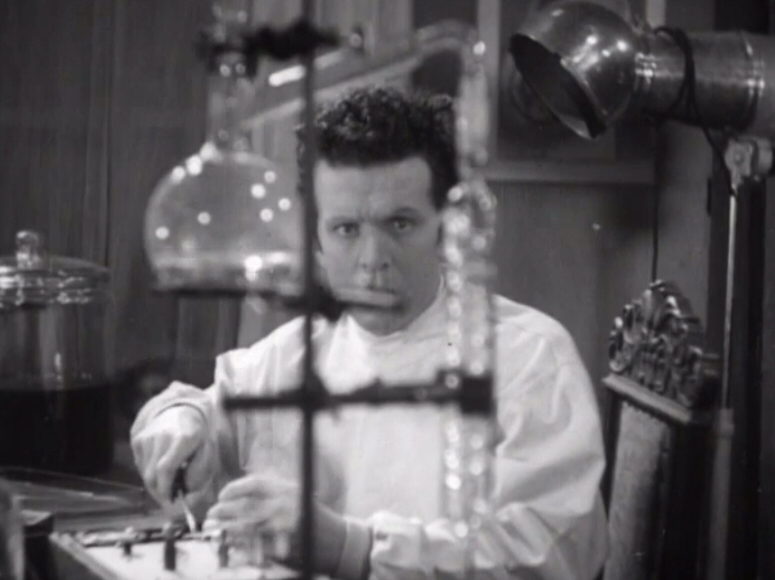
Daring Dive Into Madness
MOVIE REVIEW
Maniac
-
Genre: Horror, Sci-Fi
Year Released: 1934, 2024 Kino Lorber Blu-ray
Runtime: 51m
Director(s): Dwain Esper
Writer(s): Hildegarde Stadie
Cast: Bill Woods, Horace Carpenter, Ted Edwards, Phyllis Diller, Thea Ramsey, Jenny Dark
Where To Watch: available now, order your copy here: www.kinolorber.com or www.amazon.com
RAVING REVIEW: Dwain Esper's 1934 creation, MANIAC, steers clear of the typical storytelling path, veering instead into the turbulent waters of early exploitation cinema. Marketed as an educational study of mental illness, the film blends jarring visuals and hyperbolic acting that break from conventional plot lines, lending it a distinctive allure that still resonates with audiences today.
In MANIAC, we are thrust into the chaotic world of Dr. Meirschultz, a scientist on the edge, obsessed with resurrecting the dead. The narrative takes a sharp turn when his assistant, Maxwell—a failed actor with demons of his own—takes over the scientist's identity following a fatal mishap. Deeper chaos ensues, with Maxwell’s actions drawing loosely from Edgar Allan Poe's ‘The Black Cat.’ This literary nod does more to embellish the script than to propel the plot.
The film's visual and thematic boldness sets it apart from its peers. MANIAC revels in the explicit, with scenes filled with gratuitous nudity and disturbing acts of violence that include the shocking mutilation of a cat's eye. This unapologetic plunge into darkness imbues the film with an eerie, enduring impact.
The cinematography of MANIAC is as eclectic as its storyline. The erratic use of stock footage and intertitles adds to the film’s fragmented aesthetic. Esper's sporadic insertion of slides purporting to educate on mental illnesses seems more a nod to evading censors than to inform, weaving an added layer of the surreal into the experience.
The performances are wildly theatrical. William Woods, as Maxwell, navigates the extremes of insanity with a flair that oscillates between horror and dark comedy. The ensemble cast, from the convulsing mortuary workers to women in bizarre treatment scenes, enhances the film's outlandish atmosphere, each character seemingly plucked from a disparate narrative to add their brand of strangeness.
From a filmmaking perspective, MANIAC could be viewed as a primer on what not to do. Directionless scenes stretch unnecessarily or end abruptly, and uneven lighting often obscures more than it reveals. Yet Esper's liberal recycling of film footage complicates the plot further, contributing paradoxically to the film’s unique appeal. Yet somehow, the madness is mesmerizing! MANIAC also serves as a precursor to many later films in the exploitation genre, unabashedly tackling themes deemed too controversial for mainstream cinema of the time. Its boldness, highlighted by the alternate title ‘Sex Maniac,’ illustrates its intent to challenge societal norms.
Despite its numerous flaws, MANIAC secures a unique spot in cinematic history. It embodies the era when filmmakers capitalized on public intrigue with the macabre to draw crowds. Esper’s blend of sensationalism and spectacle left an indelible mark on the landscape of cult cinema.
MANIAC is more spectacle than narrative, celebrated not for its coherent storyline or polished performances but for its boldness and capacity to shock. It offers a glimpse into the unruly origins of a genre that thrives on the margins, continuing to engage those with a taste for the unconventional and presenting a raw, unpolished exploration of human nature that is as disturbing as it is compelling.
Product Extras:
Four true crime short films by Dwain Esper and Louis Sonney: You Can't Beat the Rap, The Last Hour of Killer Mears, The March of Crime, and The March of Crime (2nd Ed.)
Audio interview with Dwain Esper and Hildagarde Stadie (1982) courtesy of Mark Woods, Jr.
Audio commentary by Bret Wood (1999), author of Marihuana, Motherhood & Madness
Original theatrical trailer
2024 Re-release trailer
Trailers for Dwain Esper's Narcotic (1933) and Marihuana: Weed With Roots in Hell (1936)
Please visit https://linktr.ee/overlyhonestr for more reviews.
You can follow me on Letterboxd, Instagram, Twitter, and YouTube. My social media accounts can also be found on most platforms by searching Overly Honest Reviews.
I’m always happy to hear from my readers; please say hi or send me any questions about movies.
[photo courtesy of KINO LORBER]
DISCLAIMER:
At Overly Honest Movie Reviews, we value honesty and transparency. Occasionally, we receive free items for review, including DVDs, Blu-rays, CDs, Vinyl, Books, etc. We assure you that these arrangements do not influence our reviews, as we are committed to providing unbiased and sincere evaluations. We aim to help you make informed entertainment choices, regardless of our relationship with distributors or producers.
Amazon Affiliate Links:
Additionally, this site contains Amazon affiliate links. If you purchase through these links, we may receive a commission. This affiliate arrangement does not affect our commitment to honest reviews and helps support our site. We appreciate your trust and support in navigating these links.